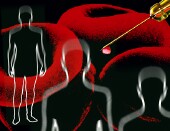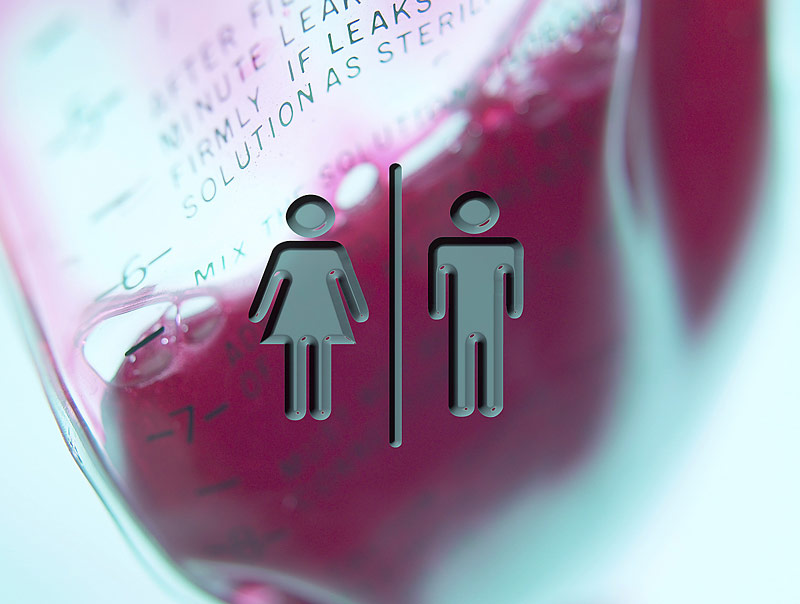
WEDNESDAY, Feb. 19, 2014 (HealthDay News) — An experimental therapy that genetically tweaks the immune system may effectively treat a type of adult leukemia that often has a grim prognosis.
Researchers found that of 16 patients with advanced B-cell acute lymphoblastic leukemia (ALL), 88 percent went into remission after being treated with genetically altered versions of their own immune system cells.
The findings, reported Feb. 19 in the journal Science Translational Medicine, extend research published last spring on the first five patients to receive the treatment.
“First and foremost, we’ve shown that this isn’t a fluke. This is a reliable result,” said study senior author Dr. Renier Brentjens, an oncologist at Memorial Sloan-Kettering Cancer Center in New York City.
There is still plenty of work to be done, he and other experts cautioned. The treatment, known as T-cell therapy, is not yet approved by the U.S. Food and Drug Administration and is only available in a research setting.
“We’re still very much in the early stages of development,” Brentjens said. But, he added, “this is potentially the first promising new therapy [for advanced B-cell ALL] in a long time.”
Another expert agreed.
“The response rates are incredibly high,” said Dr. David Porter, director of blood and marrow transplantation at the University of Pennsylvania’s Abramson Cancer Center.
Porter, who was not involved in the study, has also been researching the T-cell therapy for advanced ALL, as well as another adult leukemia called chronic lymphocytic leukemia (CLL). The results for the ALL patients have not been published in a journal yet, but Porter said they’ve shown similar response rates.
“This opens up a possibility for patients who currently have no other options,” Porter said.
ALL is a cancer of the blood and bone marrow that progresses quickly. The standard first treatment is three separate rounds of chemotherapy drugs, and for many patients it does beat back the cancer.
Unfortunately, B-cell ALL often returns. At that point, the only hope for long-term survival is to have another round of chemo that wipes out the cancer, followed by a bone marrow transplant.
But when the cancer recurs, it is likely to be resistant to many chemo drugs, Brentjens explained. The experimental therapy uses a different approach, recruiting the immune system to target specific proteins on ALL cells.
Doctors take immune system T-cells from patients’ blood, then genetically engineer the cells to activate a type of receptor that allows the T-cells to recognize and destroy ALL cells.
The 16 patients in this study received infusions of their tweaked T-cells after having standard chemotherapy. Overall, 14 patients — or 88 percent — went into remission. Seven patients (44 percent) were then able to have a bone marrow transplant.
Several other patients couldn’t receive a transplant — either because their remission was not “complete” or because of other medical conditions, such as heart disease, that make the procedure too risky. Two patients declined to have a transplant.
Still, the fact that 44 percent of the patients went on to a bone marrow transplant is notable, said Dr. Subhakar Mutyala, a radiation oncologist at Scott & White Healthcare in Temple, Texas.
Typically, that happens for only 5 percent of patients with recurrent B-cell ALL, said Mutyala, who was not involved in the new research.
The results are “very encouraging,” he said, but since they’re based on only 16 patients, larger studies are needed.
In the United States, slightly more than 6,000 people will be diagnosed with ALL this year and an estimated 1,440 will die, according to the American Cancer Society. ALL most often arises in children, but adults account for about three-quarters of deaths from this cancer.
Brentjens said about 30 percent of adults with B-cell ALL are cured. (Most cases of ALL are the B-cell form.) When the cancer recurs, patients have a shot at long-term survival if they can get a bone marrow transplant. But if their cancer resists the pre-transplant chemo, the outlook is grim.
For now, T-cell therapy is being studied as a “bridge” to a bone marrow transplant for these ALL patients — because, Brentjens said, “that is the standard of care.”
But, he said, one question is whether T-cell therapy alone can bring about long-term remission. The researchers are continuing to follow the study patients who were ineligible for a bone marrow transplant, to see how they fare in the long run.
Porter agreed that this is a key question. “Going forward, we want to learn whether this therapy, alone, might be curative,” he said.
The T-cell therapy does have side effects, including persistent fever, blood pressure drops and difficulty breathing — known as “cytokine release syndrome [CRS].” In this study, seven of 16 patients developed severe CRS, Brentjens said.
It’s not clear whether the T-cell therapy could be used in other types of cancers. But the question is being studied.
Brentjens and a colleague on the work, Dr. Michel Sadelain, are co-holders of a patent that covers the technology used to create the modified T-cells in this study. The technology was licensed to Juno Therapeutics last December.
More information
Learn more about adult ALL from the American Cancer Society.
Copyright © 2026 HealthDay. All rights reserved.

